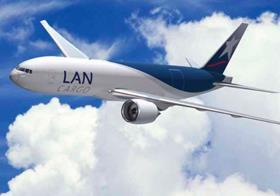
The government of Tucumán in Argentina has reportedly signed an agreement with LAN Cargo Argentina to airfreight the region’s fresh blueberries direct to Miami in the US.
The airline has been developing a logistics network for the fruit since 2007, offering three initial charter flights which last year rose to 25.
Under the new cooperation agreement, Tucumán is now expected to see increasing demand from the US, according to a local news report.
Blueberry exports from Tucumán reached 14,000 tonnes last year, of which 87 per cent (12,000 tons) was shipped by air.
The US and Canada were the main destinations, receiving 9,000 tonnes, with the majority was delivered by LAN Cargo, the report said.
“Given growing demand for blueberries in the US, this service is big business for Tucumán by bringing our fruit to the US market for and around Thanksgiving Day,” Governor José Alperovich told the publication.
“Blueberry growing is a labour-intensive activity employing near to 60,000 people in Tucumán alone,” Mr Alperovich added.
LAN Cargo Argentina general manager Carlos Larraín said the airline is proud “to be able to fulfil producers’ and governors’ dreams of seeing their products reaching major world markets directly”.
“Exporting fresh, non-frozen fruit, which fetches higher prices, is a first for Tucumán,” Mr Alperovich remarked.
“Our agreement with LAN has enabled us to penetrate the US market, and the total transit time from harvest to market is a mere 20 hours. That means that blueberries collected in Tucumán today will be on US consumers’ tables tomorrow.”
Growers of other fruit in and around Tucumán (mainly avocados and strawberries) are also allegedly seizing the opportunity offered by the direct airfreight service, thereby helping to turn Tucumán into a northern Argentinean fresh produce export hub.
Although unable to predict Argentinean blueberry export volume this year, LAN Cargo has been quoted as saying it expects overall demand to hold steady, in spite of fluctuations as the recession continues to affect consumer purchasing power.



